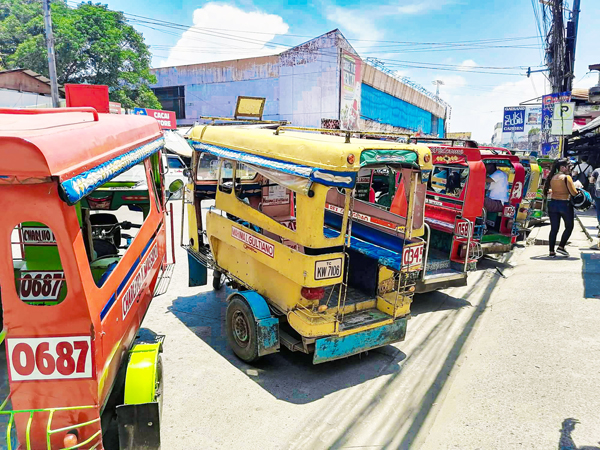CAGAYAN DE ORO CITY – A group of tricycle drivers and operators in this city has shunned digital payments because it is not applicable to their public utility vehicle.
Paul Cempron, chairman of the Federation of Motorela Drivers and Operators in Cagayan de Oro, said the enactment of proposed Ordinance No. 2023-283, or the Paleng-QR Plus PH program of Cagayan de Oro City, will result into hardship as many tricycle drivers don’t have smart phones and don’t know how to operate mobile wallet apps.

TRICYCLES wait for passengers near Barangay Carmen Public Market in Cagayan de Oro City. (Franck Dick Rosete)
“It would be a hassle to operate that and will result in additional time for us just to cash in (the money),” Cempron said on Wednesday, September 13.
The Paleng-QR PH Plus Program, which was developed by the Bangko Sentral ng Pilipinas (BSP) and the Department of Interior and Local Government (DILG), promotes financial inclusion and cashless transactions in public markets, community stores, and local public transportation in the country.
The city council committee on trade and commerce proposed the ordinance to enjoin public markets, community stores, and local public transportation to make QR Ph payment available for their customers and passengers.
Cempron appreciated the plan and the purpose of the government and the local government unit but he said the government can implement it in sectors where digital payment is applicable.
"The others can ask help from their children. But for the drivers, especially on the ground, it would be a hassle because they need to check their phones and check if the payment was received," Cempron said.
During the city council session on September 4, Councilor Malvern Esparcia, member of the committee on trade and commerce, said that cash payment will remain, but covered merchants and public transportation "can no longer say that they can’t accept online payment transactions."
"They should have options," Esparcia said as he delivered a manifestation to the proposed ordinance.
Subsection (c) of Section 5 of the ordinance mandates covered merchants and public transportation to make QR PH payments available and that if the covered entity does not have a QR-Ph-ready transaction account, “the entity commits to having an account six months after the effective date of the ordinance."
Councilor George Goking, chairman of the trade and commerce committee, sought for comment about Esparcia’s statement, explained that the proposed ordinance is "not obligatory" and acknowledged the capacity of the covered traders.
The requirement to have an account is an option, Goking said, as they did not provide a penalty clause in the ordinance.
The city government is planning to provide incentives to stores and public transportation that would follow the Paleng-QR PH Plus Program.
However, Section 6 of the ordinance, which provides incentives, is still incomplete based on the opinion of the City Legal Office, prompting it to ask the committee on trade and commerce to provide a comprehensive incentive clause.
"They (the BSP) will have an information drive before the actual implementation of Paleng-QR," Goking said. “This is to educate the covered merchants and public transportation about the importance of the program.”
Due to so many questions raised by aldermen here on September 4, the proposed ordinance was deferred, and the city council is planning to invite the BSP in the next session to address various questions.